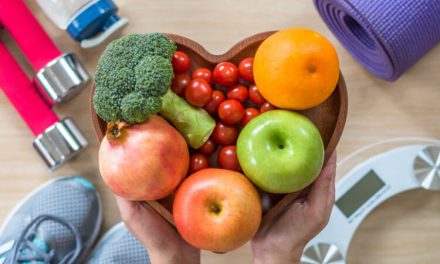

Februa
February is American Heart Month. American Heart Month is a great way to remind Americans to focus on keeping their hearts healthy. According to the American Heart Association, cardiovascular disease, including heart disease and stroke, is the leading cause of death with more than 17.3 million deaths each year and this number is expected to rise to more than 23.6 million by 2030.
As a nutritionist, I’ve seen firsthand how a heart-healthy lifestyle, including a healthy diet, can make a huge difference in improving one’s health. A heart-healthy diet consists of foods rich in fruits, vegetables, whole grains, and healthy proteins (fish, legumes); and low in added sugar, salt, and saturated fats (margarine, butter, fatty meats).
This February, in honor of American Heart Month, eat your heart out with my top picks below. Your heart will be happy! And keep a focus on including more heart healthy foods all year long—not just for the month of February.
1.BERRIES
Berries, including blueberries, strawberries, blackberries, and raspberries, are chock full of heart-healthy antioxidants, polyphenols and fiber, which help fight chronic diseases including heart disease. They are also a good source of vitamin C which has been linked to a lower risk of stroke. And they taste great too! For an added nutrition boost, add your favorite berries to cereal, yogurt, smoothies, and salads. Your heart—and your waist—will be happy.
2. OATMEAL
Oatmeal contains soluble fiber which has been shown to lower cholesterol levels. The type of fiber in oatmeal, beta glucans, may be particularly beneficial for heart health and for weight control. Oatmeal also contains the minerals magnesium and potassium also good for the heart. So next time you are looking for a healthy breakfast cereal, choose the oatmeal instead of the cream of wheat. And for an added boost of nutrition, top it with berries and a tablespoon of chia seeds.
3. CRUCIFEROUS VEGETABLES
Cruciferous vegetable, which include broccoli, kale, collards, cabbage, bok choy, Brussels sprouts, and cauliflower are members of the Brassica family and known to be rich in fiber, vitamins, minerals, and phytochemicals which have have antioxidant properties and help fight heart disease.
Broccoli, for example, is chock full of vitamin C, the mineral calcium, fiber, and vitamin A. It is also rich in sulforaphane, a health-promoting compound that can fight disease. Cauliflower may not be green, but it is full of heart-healthy properties; it contains antioxidants, fiber, and allicin, a component found in garlic known to reduce cholesterol and reduce the risk of heart attacks. Cruciferous vegetables taste great when roasted with a little olive oil and your favorite spices.
4. SALMON
Salmon and other fatty fish, including arctic char, trout and sardines, contain heart-healthy fats know as omega-3, which have been shown to lower triglycerides, reduce inflammation, and decrease the risk of plaque in the arteries. Current guidelines suggest eating fish twice a week, and for good reason. Whether eating out or eating in, choose grilled salmon instead of a steak as your protein option.
5. OLIVE OIL
Olive oil, especially extra virgin (EVOO), contains high levels of “heart healthy” monounsaturated fats and antioxidants to help unclog your arteries. Best to use an olive oil based dressing instead of creamy varieties such as ranch and blue cheese. However, it’s important not to over pour; aim for 1-2 tablespoons, or a shot glass worth.
6. BEANS AND LEGUMES
Eating small amounts of beans, peas, and lentils (known as pulses) is good for your heart. They are high in soluble fiber which helps to lower cholesterol and heart-healthy flavonoids shown to lower your risk for heart attack and strokes. Eating just one serving of beans or legumes per day has been shown to reduce LDL or “bad cholesterol.” Pulses are also high in fiber and are a terrific source of plant protein helping to keep you full—and trim, an added bonus for maintaining heart health. Top your salad with chickpeas, enjoy a lentil or split pea soup, or have a snack of hummus and veggies.
I am a fan of nuts and seeds and recommend them to my clients for heart health. Nuts contain protein, the antioxidant vitamin E, and heart-healthy fats. Sprinkle chopped walnuts and flaxseeds into your morning yogurt and enjoy a handful of almonds or an apple with a tablespoon of peanut butter for a healthy afternoon snack. One handful of your favorite nuts will satisfy both your hunger—and your heart! Two caveats: eat your nuts unsalted of course! And practice portion control.
Yes, you can enjoy a glass of red wine with your grilled salmon and vegetable medley. While moderate alcohol is good for the heart and elevates good (HDL) cholesterol, red wine, in particular contains resveratrol, a compound with antioxidant properties, which can help prevent heart disease and other chronic diseases. Practice moderation, of course. Women can enjoy one drink a day while men can enjoy two drinks a day. However, no one got heart disease from a deficiency of alcohol, so if you don’t drink, please don’t start. Enjoy!
** If you feel you need additional help with meal planning, weight loss, optimizing your immune health, food shopping tips, or creating a healthy habits at this time, I’m happy to help. I currently have a few openings for VIRTUAL NUTRITION COUNSELING SESSIONS. I can be reached by clicking here to discuss your unique needs and set up a free 15-minute discovery call. https://save-one-person.myshopify.com/collections/all/products/nutrition-counseling-with-our-in-house-rdn-doctor
ry is American Heart Month. American Heart Month is a great way to remind Americans to focus on keeping their hearts healthy. According to the American Heart Association, cardiovascular disease, including heart disease and stroke, is the leading cause of death with more than 17.3 million deaths each year and this number is expected to rise to more than 23.6 million by 2030.
As a nutritionist, I’ve seen firsthand how a heart-healthy lifestyle, including a healthy diet, can make a huge difference in improving one’s health. A heart-healthy diet consists of foods rich in fruits, vegetables, whole grains, and healthy proteins (fish, legumes); and low in added sugar, salt, and saturated fats (margarine, butter, fatty meats).
This February, in honor of American Heart Month, eat your heart out with my top picks below. Your heart will be happy! And keep a focus on including more heart healthy foods all year long—not just for the month of February.
1.BERRIES
Berries, including blueberries, strawberries, blackberries, and raspberries, are chock full of heart-healthy antioxidants, polyphenols and fiber, which help fight chronic diseases including heart disease. They are also a good source of vitamin C which has been linked to a lower risk of stroke. And they taste great too! For an added nutrition boost, add your favorite berries to cereal, yogurt, smoothies, and salads. Your heart—and your waist—will be happy.
2. OATMEAL
Oatmeal contains soluble fiber which has been shown to lower cholesterol levels. The type of fiber in oatmeal, beta glucans, may be particularly beneficial for heart health and for weight control. Oatmeal also contains the minerals magnesium and potassium also good for the heart. So next time you are looking for a healthy breakfast cereal, choose the oatmeal instead of the cream of wheat. And for an added boost of nutrition, top it with berries and a tablespoon of chia seeds.
3. CRUCIFEROUS VEGETABLES
Cruciferous vegetable, which include broccoli, kale, collards, cabbage, bok choy, Brussels sprouts, and cauliflower are members of the Brassica family and known to be rich in fiber, vitamins, minerals, and phytochemicals which have have antioxidant properties and help fight heart disease.
Broccoli, for example, is chock full of vitamin C, the mineral calcium, fiber, and vitamin A. It is also rich in sulforaphane, a health-promoting compound that can fight disease. Cauliflower may not be green, but it is full of heart-healthy properties; it contains antioxidants, fiber, and allicin, a component found in garlic known to reduce cholesterol and reduce the risk of heart attacks. Cruciferous vegetables taste great when roasted with a little olive oil and your favorite spices.
4. SALMON
Salmon and other fatty fish, including arctic char, trout and sardines, contain heart-healthy fats know as omega-3, which have been shown to lower triglycerides, reduce inflammation, and decrease the risk of plaque in the arteries. Current guidelines suggest eating fish twice a week, and for good reason. Whether eating out or eating in, choose grilled salmon instead of a steak as your protein option.
5. OLIVE OIL
Olive oil, especially extra virgin (EVOO), contains high levels of “heart healthy” monounsaturated fats and antioxidants to help unclog your arteries. Best to use an olive oil based dressing instead of creamy varieties such as ranch and blue cheese. However, it’s important not to over pour; aim for 1-2 tablespoons, or a shot glass worth.
6. BEANS AND LEGUMES
Eating small amounts of beans, peas, and lentils (known as pulses) is good for your heart. They are high in soluble fiber which helps to lower cholesterol and heart-healthy flavonoids shown to lower your risk for heart attack and strokes. Eating just one serving of beans or legumes per day has been shown to reduce LDL or “bad cholesterol.” Pulses are also high in fiber and are a terrific source of plant protein helping to keep you full—and trim, an added bonus for maintaining heart health. Top your salad with chickpeas, enjoy a lentil or split pea soup, or have a snack of hummus and veggies.
I am a fan of nuts and seeds and recommend them to my clients for heart health. Nuts contain protein, the antioxidant vitamin E, and heart-healthy fats. Sprinkle chopped walnuts and flaxseeds into your morning yogurt and enjoy a handful of almonds or an apple with a tablespoon of peanut butter for a healthy afternoon snack. One handful of your favorite nuts will satisfy both your hunger—and your heart! Two caveats: eat your nuts unsalted of course! And practice portion control.
Yes, you can enjoy a glass of red wine with your grilled salmon and vegetable medley. While moderate alcohol is good for the heart and elevates good (HDL) cholesterol, red wine, in particular contains resveratrol, a compound with antioxidant properties, which can help prevent heart disease and other chronic diseases. Practice moderation, of course. Women can enjoy one drink a day while men can enjoy two drinks a day. However, no one got heart disease from a deficiency of alcohol, so if you don’t drink, please don’t start. Enjoy!
** If you feel you need additional help with meal planning, weight loss, optimizing your immune health, food shopping tips, or creating a healthy habits at this time, I’m happy to help. I currently have a few openings for VIRTUAL NUTRITION COUNSELING SESSIONS. I can reached https://save-one-person.myshopify.com/collections/all/products/nutrition-counseling-with-our-in-house-rdn-doctor to discuss your unique needs and set up a free 15-minute discovery call.



